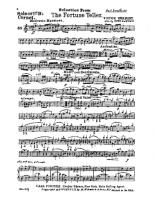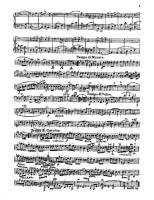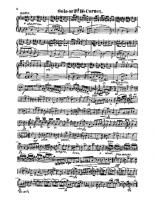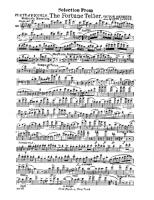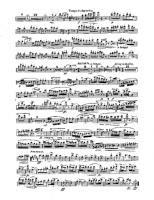Victor Herbert Sheet Music
Victor August Herbert (February 1, 1859 – May 26, 1924) was an Irish-born, German-raised American composer, cellist and conductor. Although Herbert enjoyed important careers as a cello soloist and conductor, he is best known for composing many successful operettas that premiered on Broadway from the 1890s to World War I. He was also prominent among the tin pan alley composers and was later a founder of the American Society of Composers, Authors, and Publishers (ASCAP). A prolific composer, Herbert produced two operas, a cantata, 43 operettas, incidental music to 10 plays, 31 compositions for orchestra, nine band compositions, nine cello compositions, five violin compositions with piano or orchestra, 22 piano compositions and numerous songs, choral compositions and orchestrations of works by other composers, among other music.
In the early 1880s, Herbert began a career as a cellist in Vienna, Austria, and Stuttgart, Germany, during which he began to compose orchestral music. Herbert and his opera singer wife, Therese Förster, moved to the U.S. in 1886 when both were engaged by the Metropolitan Opera. In the U.S., Herbert continued his performing career, while also teaching at the National Conservatory of Music, conducting and composing. His most notable instrumental compositions were his Cello Concerto No. 2 in E minor, Op. 30 (1894), which entered the standard repertoire, and his Auditorium Festival March (1901). He led the Pittsburgh Symphony from 1898 to 1904 and then founded the Victor Herbert Orchestra, which he conducted throughout the rest of his life.
Herbert began to compose operettas in 1894, producing several successes, including The Serenade (1897) and The Fortune Teller (1898). Even more successful were some of the operettas that he wrote after the turn of the 20th century: Babes in Toyland (1903), Mlle. Modiste (1905), The Red Mill (1906), Naughty Marietta (1910), Sweethearts (1913) and Eileen (1917). After World War I, with the change of popular musical tastes, Herbert began to compose musicals and contributed music to other composers' shows. While some of these were well-received, he never again achieved the level of success that he had enjoyed with his most popular operettas.
In the early 1880s, Herbert began a career as a cellist in Vienna, Austria, and Stuttgart, Germany, during which he began to compose orchestral music. Herbert and his opera singer wife, Therese Förster, moved to the U.S. in 1886 when both were engaged by the Metropolitan Opera. In the U.S., Herbert continued his performing career, while also teaching at the National Conservatory of Music, conducting and composing. His most notable instrumental compositions were his Cello Concerto No. 2 in E minor, Op. 30 (1894), which entered the standard repertoire, and his Auditorium Festival March (1901). He led the Pittsburgh Symphony from 1898 to 1904 and then founded the Victor Herbert Orchestra, which he conducted throughout the rest of his life.
Herbert began to compose operettas in 1894, producing several successes, including The Serenade (1897) and The Fortune Teller (1898). Even more successful were some of the operettas that he wrote after the turn of the 20th century: Babes in Toyland (1903), Mlle. Modiste (1905), The Red Mill (1906), Naughty Marietta (1910), Sweethearts (1913) and Eileen (1917). After World War I, with the change of popular musical tastes, Herbert began to compose musicals and contributed music to other composers' shows. While some of these were well-received, he never again achieved the level of success that he had enjoyed with his most popular operettas.
Piano
8
pages
6.88MB - 666d ago
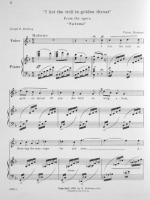
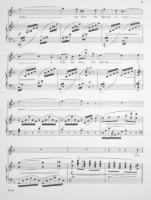
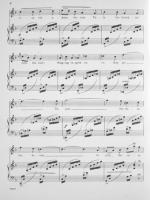
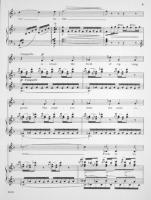
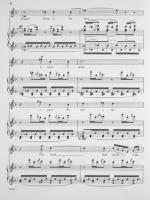
...
Piano
6
pages
2.4MB - 528d ago
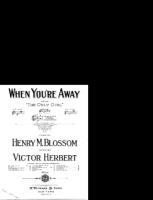
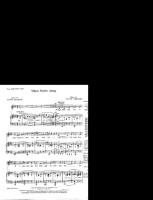
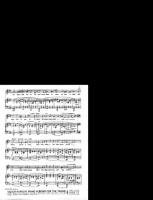
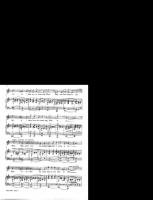
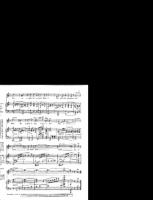
...
Search for Free Sheet Music
You can make a search through the entire collection of sheets.
You can make a search through the entire collection of sheets.
Latest Artists
Stone Sour
× 1
Alex North × 2
Aris Carastathis × 1
Stephen Rippy × 1
Z. RANDALL STROOPE × 1
Bukas Palad × 1
Michael Kooman × 1
james william elliott × 1
W. Wiegand × 1
John Murphy × 1
Simon Phillips × 1
King's Singers × 1
Zoltan Paulinyi × 2
Avril Lavigne × 1
Bond Quartet × 1
Paganini × 4
ABBA × 3
Al Di Meola × 1
Hajime Hirasawa × 1
Hector Berlioz × 1
Alan Bullard × 1
Alessandra Visentin × 1
Bobby Timmons × 1
Rachmaninoff × 2
Antonio Faraò × 1
Elton John × 4
Huub de Lange × 2
Zorba (musical) × 1
Scott Alan × 2
Riya × 1
Pablo de Sarasate × 1
Astor Piazzolla × 4
The Allman Brothers Band × 1
Ira B.Arenstein × 1
Alec Rowley × 1
Arthur Hamilton × 2
Stephen Schwartz × 1
Hans Zimmer × 2
Koji Kondo × 6
Dragon Ball × 1
Pachelbel × 3
Seymour Simons × 1
Chihiro Yonekura × 1
Rumbling Hearts × 1
Keith Martin × 1
Pixinguinha × 2
Janis Joplin × 1
Akira Senju × 1
Richard Clayderman × 1
Eugene Ysaye × 1
Alex North × 2
Aris Carastathis × 1
Stephen Rippy × 1
Z. RANDALL STROOPE × 1
Bukas Palad × 1
Michael Kooman × 1
james william elliott × 1
W. Wiegand × 1
John Murphy × 1
Simon Phillips × 1
King's Singers × 1
Zoltan Paulinyi × 2
Avril Lavigne × 1
Bond Quartet × 1
Paganini × 4
ABBA × 3
Al Di Meola × 1
Hajime Hirasawa × 1
Hector Berlioz × 1
Alan Bullard × 1
Alessandra Visentin × 1
Bobby Timmons × 1
Rachmaninoff × 2
Antonio Faraò × 1
Elton John × 4
Huub de Lange × 2
Zorba (musical) × 1
Scott Alan × 2
Riya × 1
Pablo de Sarasate × 1
Astor Piazzolla × 4
The Allman Brothers Band × 1
Ira B.Arenstein × 1
Alec Rowley × 1
Arthur Hamilton × 2
Stephen Schwartz × 1
Hans Zimmer × 2
Koji Kondo × 6
Dragon Ball × 1
Pachelbel × 3
Seymour Simons × 1
Chihiro Yonekura × 1
Rumbling Hearts × 1
Keith Martin × 1
Pixinguinha × 2
Janis Joplin × 1
Akira Senju × 1
Richard Clayderman × 1
Eugene Ysaye × 1






